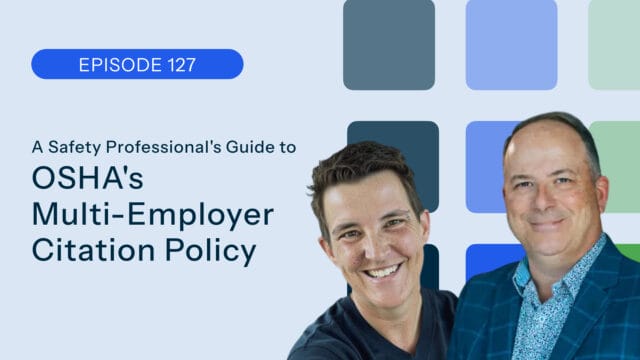
OSHA’s Multi-Employer Citation Policy | Risk Matrix Episode 127
THE RISK MATRIX Cutting-edge podcast on occupational safety and risk management. Hosted by industry titans: JAMES JUNKIN, MS, CSP, MSP,…
Although there are plenty of deliverables OQ vendors offer, here are five that should factor the most during your final selection.

Dissatisfaction with training or support, the ongoing quality of the operator qualification (OQ) program itself, or an issue during an audit could drive an operator to make a change in their OQ partner.
Although there are plenty of deliverables OQ vendors offer, here are four that should factor the most during your final selection:
Take a good, hard look at how the OQ partner will help you analyze and improve the defensibility of your program on a continuous basis.
Inquire how the OQ vendor provides transparency on how third-party evaluators are authorized and tracked to validate they are following your qualification methodology. You don’t want evaluators who take shortcuts while qualifying individuals. The key to defensibility is having workers perform tasks while complying with your requirements. The integrity of your OQ program rests with the assurance that work is being performed according to your procedures, training, and task criteria with the documentation to back it up.
One of the most crucial deliverables you should seek from your OQ partner is the ability to continuously improve and mature your program. Be confident while defending your OQ program during state and federal audits. Protect people, property, and the environment by having a sustainable OQ program.
Does the OQ vendor settle for the industry standard when it comes to its task list, whether American Society of Mechanical Engineers (ASME) B31Q or the American Petroleum Institute (API) task list?
There is nothing wrong with using those task lists as a guide when building the foundation for the program. As regulations and technology evolve, so must the task list in order to stay current with industry best practices. However, each operator must determine what is a covered task using the four-part test before adding a new task to their program.
OQ training often features a trainer presenting voice-over with a slideshow of dos and don’ts. That’s not the type of training today’s operators need. Similarly, post-training examination often feels too much like it’s trying to “trick” trainees into making mistakes. Instead, OQ training needs to:
The goal is to set up a training program which helps ensure the proper performance of tasks on your facility in accordance with your specific operational considerations and requirements.
Any additional professional services and support an OQ vendor can offer will help the operator in the long run. Look for a vendor who can serve as a trusted partner to help maintain your OQ program. The ability to lean on the vendor during audit preparations — and even have them advise you during the audit itself — brings the best of the OQ and consultant worlds together.
Operators will often hire third-party consultants to write their OQ program for them, and then hire an OQ provider separately to run the program, but there may be pitfalls to this detached approach. Be fully engaged and implement your program as intended with a full-service partner. Use data to add visibility and reduce risk with real-time information to drive improvement and defensibility.
Now that you have an OQ program and task list in place, how do you execute to meet your compliance obligations? Do you have a vendor partner that can provide you transparency and data to identify gaps that become actionable items for your organization to reduce risks?
A defendable OQ program is one that you can execute at the company and worker level. This is especially true when you consider you have the same regulatory obligations for internal employees and contracted workers. Select a vendor that can help you accomplish the intent of your program and maintain accountability at every phase.
Onboarding with a new OQ partner can be a logistical headache for operators. Anxiety can be high, but focusing on these four criteria can ease some of the burdens.
The right OQ vendor will work diligently to make the transition as smooth as possible, transferring data, qualifications, and certifications over from the previous system.
Only Veriforce provides a comprehensive OQ compliance solution that’s delivered through one vendor and system, and backed by quality assurance and audit services to ensure the integrity of your OQ records and end-to-end OQ processes. Veriforce OQ personnel audit services safeguard the quality of your OQ program, and more than 175 computer-based training courses help personnel prepare for covered task evaluations. In addition, Veriforce partners with its pipeline operator clients to maintain a common covered task list, differentiating Veriforce from off-the-shelf options.
Let Veriforce use its extensive experience to help with the management of the change process, so you can focus on the execution of your program.


THE RISK MATRIX Cutting-edge podcast on occupational safety and risk management. Hosted by industry titans: JAMES JUNKIN, MS, CSP, MSP,…

THE RISK MATRIX Cutting-edge podcast on occupational safety and risk management. Hosted by industry titans: JAMES JUNKIN, MS, CSP, MSP,…
We’ll send you practical and insightful supply chain risk management info that can benefit your business. Plus, important company updates that keep you in the loop.
